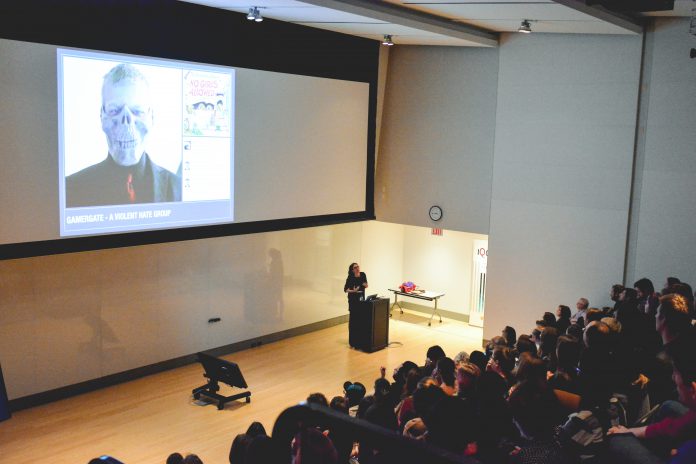
Within room 0101 in the Quantum-Nano Centre, the tension was palpable. There was an anxiety about angry emails and possible threats. This wasn’t a vague threat either. Even before the event, a Twitter response had been left on @UWaterloo’s promotion of Brianna Wu’s public talk: “Why are you promoting a GG troll?” That response was given, meticulously, to every account that had promoted this event on Twitter.
The presence of two police officers confirmed a reason for anxiety. Even in a Canadian crowd, loud, even violent protesters were a real fear. As Wu spoke, a slide show displayed the hysterical ramblings of a death threat against her. Wu made clear that she has had to face this possibility, even without police help.
For the uninitiated, the Gamergate controversy has plagued the discussions of gaming forums and news sites for years, and has found its way into the fringes of conventional news. Wu even mentions the Law and Order episode based on her experiences with Gamergate. “There’s no good way to be on Law and Order,” Wu said.
The actual definition of Gamergate differs depending on who’s giving it, but the outcome is undeniably nefarious. On one side, there is the call for diversity, feminism, and social progress in gaming culture. On the other side is a reaction against these changes that generally manifests as online harassment, doxxing (publically revealing another person’s information on the Internet for malicious purposes), and death threats. The actions of the latter group, along with the harassment and controversies they create, all fall under the umbrella term of Gamergate.
The examples of harassment are harrowing. The laundry list of incidents and victims is long. Anita Sarkeesian. Zoe Quinn. The July “Giant Bomb” incident. Even under some pretense of a deluded sense of justice, it becomes hard to justify just how viscerally vile the threats spouted towards Wu were. A hysterical man in a YouTube video screams unintelligibly about his car crashing, before moving into a conspiracy theory about the car cash being caused by Wu somehow. Death threats became real problems that needed to be heeded. There were so many, she had to have someone else keep track of them. The police barely acted whenever the threats were brought to their attention.
Regardless of the controversy around her, Wu’s personality shone through in her presentation. Wu was quick to remind the audience that she is, at heart, a game developer. She would rather talk about her favourite games like Mass Effect 2 or the Tomb Raider reboot than the subject of feminism. But she carried a perceivable frustration at the plight of other women harmed by the more hazardous parts of the gaming industry. A palpable anger filled her voice at women being driven out of the industry. She characterized herself, in the face of online disturbances, as Xena, warrior princess. An image of a leather-skirted, chakram-wielding badass riding defiantly against a horde of hatred comes to mind. “Fuck you guys, bring it on,” she said.
Wu’s message is about progress in the face of adversity. “I’m flawed too,” Wu admitted, and she recognized the need for people to challenge unconscious bias and learn from mistakes. Moreover, she warned against treating people making such biased mistakes as pariahs. She calls for Twitter and YouTube to do more to remove harassment from their respective sites. Wu pleaded that men need to do as much as women to solve this problem, maybe more. She asked people to surpass whatever inconvenience would occur, and actually do something to change things.
With the rise of the alt-right and white nationalism throughout the American election, Gamergate rings as another part of a reaction against the progressivism that the Western world seems to be within. Will harassment prevail, or is the change of gaming culture necessary, even inevitable? Does gaming culture remain the “boys club” of the Nintendo ‘90s, or does it change just as its demographics have? Do we stay the same, or change? With the harrowing harassment of Gamergate festering, for Brianna Wu and the many women of gaming, change in the gaming industry may be the only answer that’s acceptable.































